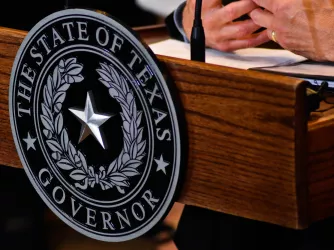Table of Contents
Fourteen state attorneys general file amicus brief defending new Title IX regulations

On June 4, 18 attorneys general, from 17 states and the District of Columbia (Plaintiffs), filed a lawsuit challenging the free speech and due process protections in the Department of Education’s new Title IX regulations. This was the largest of four lawsuits filed so far that are aiming to prevent those protections from ever taking effect.
Yesterday, in a welcome development, the attorneys general from 14 other states (Amici States) filed an amicus brief to defend the regulations. In their brief, the attorneys general of Texas, Alabama, Alaska, Arkansas, Florida, Georgia, Indiana, Kentucky, Louisiana, Mississippi, Oklahoma, South Carolina, South Dakota, and Tennessee make three arguments in defense of the new regulations.
First, the Amici States argue that the new regulations “set[] forth reasonable standards for combating gender discrimination in educational programs while safeguarding free speech and due process.” In support of this assertion, the Amici States emphasize that the new regulations track United States Supreme Court precedent set forth in Davis v. Monroe County Board of Education and follow the direction of the numerous courts that have repeatedly struck down unconstitutionally overbroad anti-harassment policies (internal citations omitted):
Not only does the Final Rule track the language of Davis, but it also presents a reasonable response to persistent misinterpretation of Title IX by universities. Despite almost uniform precedent instructing otherwise, universities have continued to adopt overbroad policies that chill speech and sanction students, erroneously in the name of Title IX. Although courts routinely strike down such policies, their continued prevalence has a deleterious effect on free speech since the only way for students to obtain relief is through prolonged litigation.
The Final Rule puts an end to this constant recycling of discredited, unconstitutional policies. It expressly links the definition of sexual harassment to an objective standard, which, in turn, cabins Title IX to incidents where the speech “undermines and detracts from the victims’ educational experience,” as Title IX has long provided.
The Amici States’ second argument asserts, “Plaintiffs’ conscious failure to comply with Title IX and the constitutional norms—not the Final Rule—caused their alleged injuries.” In their lawsuit, the Plaintiffs (Pennsylvania, New Jersey, California, Colorado, Delaware, the District of Columbia, Illinois, Massachusetts, Michigan, Minnesota, New Mexico, North Carolina, Oregon, Rhode Island, Vermont, Virginia, Washington, and Wisconsin) claim that the regulations will cause them and the colleges and universities within their borders irreparable harm, especially if they go into effect as scheduled on August 14. The Plaintiffs are, in essence, arguing that the deadline is too short.
The Amici States, however, powerfully point out that most of the protections provided in the regulations are “already required by the Constitution and recognized by the courts.” The brief explains:
Plaintiffs in fact have a legal obligation to provide students with these safeguards anyway, and they have known for years that constitutional norms favor more procedural protections for students accused of sexual harassment, not less.
Indeed, there have been hundreds of lawsuits challenging the fundamental fairness of campus Title IX proceedings and courts in many of the Plaintiffs’ jurisdictions have questioned the sufficiency of the protections afforded by campus policies. As the Amici States point out (internal citations omitted):
[T]he federal jurisdictions in which Plaintiffs Pennsylvania, New Jersey, Delaware, and Michigan reside already oblige academic institutions to provide students accused of sexual harassment with multiple safeguards contained in the Final Rule, including a live hearing and the opportunity to cross-examine witnesses, their accuser among them.
Moreover, as the brief demonstrates, schools across the country have been on notice for years that the procedural protections they provide in Title IX cases are inadequate. (And, of course, FIRE also offers a regulation-compliant model code that colleges may adopt or borrow from, sparing them from most of the hard work.)
The final argument advanced by the Amici States is that “[s]tudents will suffer severe and irreparable harm from an injunction delaying the Final Rule.” Yet every day that the new regulations are not yet in effect is a day that institutions across the country will continue to irreparably harm students by denying them these basic procedural protections. The brief explains why the new regulations are so urgently needed and why issuing the injunction the Plaintiffs are requesting would be so harmful:
The absence of meaningful safeguards in current disciplinary schemes means that academic institutions can and have imposed life-altering consequences on students without ever giving them a real opportunity to defend themselves.
[...]
The Final Rule eliminates the need for students to suffer irreparable injuries before obtaining due process. It establishes a single, publicized standard that conforms to constitutional requirements. More to the point, it incentivizes academic institutions to meet this standard in advance by conditioning the receipt of federal funds on compliance. Should the Final Rule be delayed, then students will have no choice but to try their luck in a proceeding stacked against them.
FIRE is grateful to the Attorneys General in the Amici States for their powerful defense of student free speech and due process rights. In FIRE’s memory, there has never before been as robust a coordinated multi-state effort to defend the free speech and due process rights of university students in litigation. (It should be noted that all of the plaintiff attorneys general are Democrats, while the amici state attorneys general are all Republicans. FIRE is disappointed that this has become a partisan issue, as free speech benefits students and faculty regardless of politics or viewpoint. Yet we also understand the political realities currently in play, and the political situation makes the Amici States’ arguments no less valid or welcome.)
Finally, the opening of the Amici States’ brief eloquently argues the merits of the new regulations’ approach. The brief persuasively articulates the appropriateness of the new regulation’s balance—an approach that doesn’t champion the rights of one side over the other, but instead provides a framework where sexual misconduct can be effectively addressed within constitutional boundaries:
No one denies the urgent need to prevent sexual harassment and to punish it when it occurs. Sexual harassment of any sort is unacceptable, including harassment at our nation’s public schools and institutions of higher education. No student pursuing an education should do so in fear that she will be victimized and suffer a lifetime of trauma as a result.
For decades, however, educational institutions and the Department of Education have betrayed basic constitutional protections in an effort to purge anything offensive from campus. These constitutional abuses reached a crescendo when President Obama’s Department of Education issued its misguided 2011 Dear Colleague Letter, which trampled the rights of students and created a false choice: either combat sexual harassment or protect constitutional liberties. We propose a different option: do both.
The Department of Education’s new Final Rule accomplishes this goal.
Recent Articles
FIRE’s award-winning Newsdesk covers the free speech news you need to stay informed.

Gov. Greg Abbott’s order ‘hardening state government’ against China is dangerously hard to parse

Right, left, and in-between: Can we bring our differences to the table?

From the UK to Germany to Singapore: Police are watching what you post
